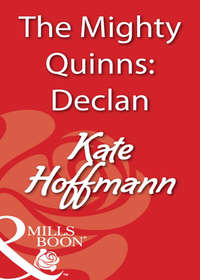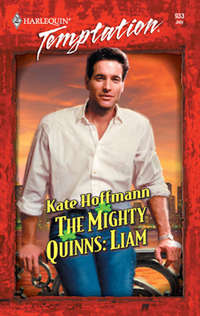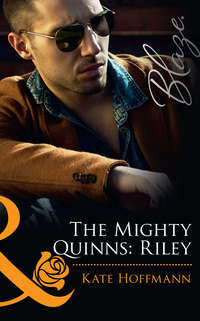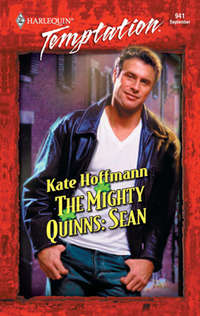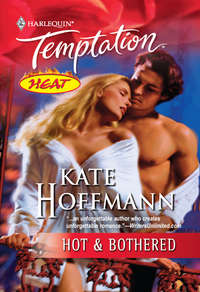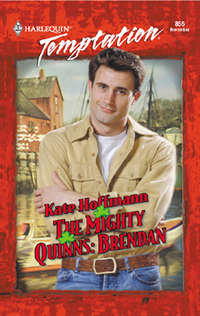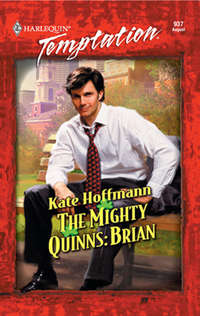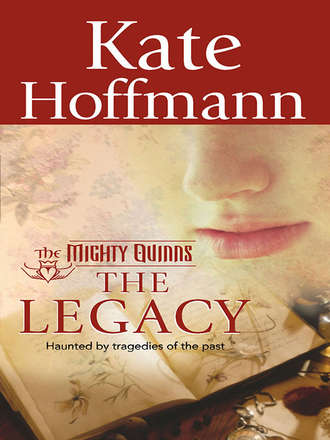
Полная версия
The Legacy

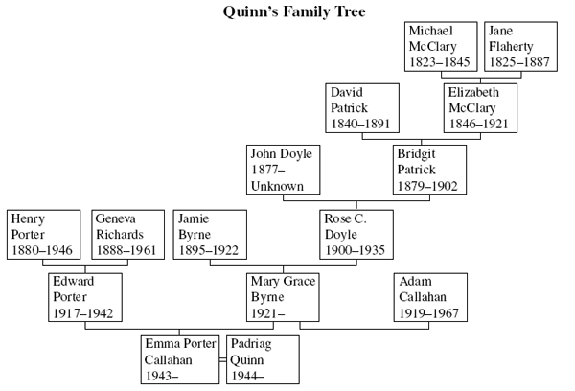
Dear Reader,
It’s difficult to believe that this is the twelfth book in my Quinn family saga. When I began this series in September 2001, I never dreamed that it would become so involved. But many of you have written and even more have bought the Quinn books, making them a very popular family!
I’ve explored the original six Quinn brothers, their sister, three of their cousins and a good number of their ancestors, as well. And in The Legacy, I return again to Ireland to tell the story of a long line of women—the ancestors of Emma Porter Callahan Quinn, the mother of my three latest Quinn heroes, Ian, Declan and Marcus. The story begins in the months before the Irish famine of the 1840s and ends in America. And like the stories that came before it, it’s a story of love and family loyalty.
I’m not sure if there will be more Quinn stories. It is a large family and there are many cousins. But for now, I’ll leave you with this book. Be sure to look for new stories from me, coming out in the Blaze line. You can keep up to date with all my releases at www.katehoffmann.com.
Happy reading,
Kate Hoffmann
The Legacy
Kate Hoffmann

KATE HOFFMANN
has penned over fifty stories for Harlequin Books since her first release in 1993. She has enjoyed creating sexy heroes that her heroines (and her readers) can’t possibly resist. Kate lives in a small town in Wisconsin with her three cats and her computer. She enjoys golfing, genealogy and gardening, and also volunteers with music and theater programs for young people in her community. Her favorite place in the whole wide world is her bedroom. Her second favorite place is Ireland, which is where the fairies worked their magic and put the Mighty Quinns in her path. The popular family saga now encompasses twelve books with the release of The Legacy.
For Marie Grace McDougall and Jack Edward Parry, together again.
CONTENTS
PROLOGUE
CHAPTER ONE
CHAPTER TWO
CHAPTER THREE
CHAPTER FOUR
CHAPTER FIVE
CHAPTER SIX
CHAPTER SEVEN
CHAPTER EIGHT
CHAPTER NINE
CHAPTER TEN
CHAPTER ELEVEN
CHAPTER TWELVE
CHAPTER THIRTEEN
CHAPTER FOURTEEN
CHAPTER FIFTEEN
CHAPTER SIXTEEN
CHAPTER SEVENTEEN
CHAPTER EIGHTEEN
CHAPTER NINETEEN
CHAPTER TWENTY
CHAPTER TWENTY-ONE
CHAPTER TWENTY-TWO
CHAPTER TWENTY-THREE
CHAPTER TWENTY-FOUR
EPILOGUE
PROLOGUE
14 April 1845
Today is my wedding day. My name is Jane Flaherty— now Jane McClary for I have married Michael McClary this morning at our parish church. I begin this diary so that I might look back in years to come on the early days of my marriage, so that I might tell my children of the tiny details of my life. And here I begin. This book was given to me by the lady who employs me as a seamstress. Her name is Mrs. Grant and she tells me I am a fine talent with needle and thread. She said it would be useful to have a place to keep my household accounts, and made of this small book, a wedding gift. But instead, I will write my thoughts and my dreams on these pages. It is for her kindness that I am able to write and read at all, for she taught me when I first went to work for her. And I will teach my daughters and they will teach theirs. Then they may all see the world in the pages of great books. My Michael has come home for his supper and I must end here.
“AMERICA?”
Jane McClary slowly sank into the rough wooden chair, placing her hands on the table. Her heart felt as if it had dropped to the floor and she stared at her husband. His eyes were bright with excitement, a quality that had made her fall in love with him the very first time they’d met.
“Surely you see.” Michael reached out and took her hands between his, the calluses rough against her skin. “Our future is there. There are jobs and good land to farm. People are leaving every day, from Dublin and from Cork. The boats are full to Liverpool and still more want to go.”
“But, our home is here,” Jane said. “Our families are here.”
Michael shook his head. “But not our future.” He glanced around the sod house. “I work until my back aches and my fingers bleed and we never get ahead. And you, you sew into the wee hours, your eyes straining to see the stitches, and for nothing more than a few shillings. How much longer can you do that, Jane? And what will happen when we have a family? It will be even more difficult to leave then. If we are to go, it must be now.”
“But we can’t afford one passage, how could we afford two?”
“We won’t,” he said. “It’s three pounds ten. We have a bit saved and Johnny Cleary says that he’ll loan me the rest for he’s taken his entire flock of sheep to market just today. And when I get there, I will find work and send for you. Our babies will be born in America, Jane, and they will grow up fine and strong. They will have a future that they could never have here in Ireland.”
Jane drew in a deep breath and let it out slowly. She had seen friends and relatives make the same decision, and though she’d heard harrowing tales of the dangers of crossing the Atlantic, all that she knew had arrived safely. And Michael was right. Ireland offered nothing to an ambitious man and he had always been that. A bit of a dreamer, too, she thought to herself. But how could she deny him this? She was his wife and bound to follow where he led, like Ruth from the Bible. It was her duty.
“When will you go?” she asked.
“In a week’s time,” he said.
“That soon?” Jane dropped her hands to her lap, twisting her fingers together nervously. They’d been married not yet three months and now he would leave her to live alone.
He reached into his pocket and pulled out a small piece of newsprint. “There. Read that. Johnny gave that to me. He says there’ll be jobs waiting for us. Good jobs with good pay.”
Jane picked up the paper and read the advertisement. “Strong Irish Lads Wanted,” she said. “Railroad work. A dollar a day, room and board included. Call at 17 Carney Street, Boston, upon arrival.” She glanced up at Michael. “And how long until I might join you?” she asked.
“They say the passage is six or seven weeks, eight if the weather turns bad. I will work through the winter and send for you in the spring. The time will fly by and you will barely know I’m gone. And during that time, you will sew curtains for our grand new house in America. I promise you, Jane, it won’t be a dark and tiny stone cottage with a leaky thatch roof. It will be a grand house made of wood, with real glass windows and a marble fireplace to keep you warm at night.”
Jane put her hand on her belly. The baby would be born in the spring, March if she counted correctly. She hadn’t told Michael yet. She’d wanted to wait just a bit longer to be certain. But now, she would keep the secret from her husband, for if he knew, then he would never leave.
She pushed away from the table and walked to the dry sink, then pulled down the small butter crock from the shelf above it. Inside was their life savings, enough to buy a pretty dress, new pair of shoes and perhaps dinner at a fancy hotel in Dublin. Jane crossed to the table and dumped the money on the scarred surface, then counted it out. “One pound, nine,” she murmured. “We can sell the cow. You’ll have to have food to eat, and a warm coat. I hear that winters are fierce in America and I won’t have you getting sick for wont of decent clothing.”
“And what will you do for milk and butter if we have no cow?”
“I will buy it in town. Mrs. Grant pays me enough to feed me. And Jack Kelly has always coveted this plot of land. He’ll be happy to take it over after I harvest the crop. I can sell the potatoes you won’t be here to eat and the garden will provide the rest. I will do quite well for myself,” Jane said with a weak smile. “You married a clever girl, Michael McClary, and you would do well not to forget that.”
Michael nodded, then rose to stand beside her. He wrapped his arms around her waist and pulled her against him, kissing her softly on the forehead. “We’ll have a fine life in America,” he said. “I’ve seen it in my dreams.”
Jane closed her eyes and pressed her cheek against his chest. His heart beat, strong and sure, and Jane tried to memorize what it felt like to be held by him. There would come a night when she’d reach across the rope bed and he wouldn’t be there. But she would be brave, for she loved this man and would follow him to the ends of the earth if he asked.
CHAPTER ONE
ROSE
Dublin, 1924
ROSE BYRNE STOOD IN THE protection of a church facade, staring out at the cold drizzle that had turned the cobblestone streets slick. The sky above was so gray she couldn’t tell if it was morning or afternoon. She’d stopped listening to the chiming of the church bells on the hour. It only made the time move more slowly.
Rain had been falling for almost three days and the dampness had set into her bones and her lungs until she wondered if she’d ever feel warm again. She closed her eyes and tried to imagine a sunny summer day from her childhood, when she’d walked in the meadows around her Grandmother Patrick’s Wexford cottage and lain in the tall grass amongst the butterflies and wildflowers.
Life had been so simple then, her dreams untarnished, her future full of promise. Though it had not been five years ago, it seemed like a lifetime now, so much had changed. She’d married at nineteen and traveled with her husband, Jamie Byrne, to Dublin where he’d found work at a mill. They’d lived in a small flat near the river, just two drafty rooms and a grimy window with a view of another tenement, so different from her grandmother’s cottage. But it might have been scalp, a hole dug in the ground with sticks for a roof, for all she and Jamie cared.
Though the country was in turmoil and Dublin at the center of it, at first Rose and Jamie paid little attention to the politics that drove Irish life. Though Jamie worked hard, his pay never seemed to be enough to buy any more than the necessities. After a time, he became frustrated and spent his evenings at the pubs instead of at home.
Rose found work taking in laundry and sewing for a well-to-do Irish merchant and his family. And when she’d discovered herself pregnant after six months of marriage, she and Jamie had looked forward to the birth of their first child. But the baby had been stillborn just a month before it was due and a miscarriage followed that.
When she found herself pregnant again, she had begged Jamie to take her back to Wexford, to use the small inheritance from her Grandmother Patrick to build a new life where the air was fresh and she might have a chance to carry her baby to term. But Jamie had become involved in a patriot’s cause, in a revolution that had been brewing for years in the pubs and factories all over Ireland. He refused to leave.
It was his duty to their unborn child, he’d argued. He wanted his children to grow up in a free Ireland, an Ireland that might promise a better future than the one he’d been dealt. But Rose was frightened she would bring a child into a world at war with itself and as her time grew near, she watched the conflict escalate and her husband take risks that put his life in danger daily.
Jamie had sworn his allegiance to the IRA, determined that Ireland become an independent and unified republic from north to south, east to west. But the Free Staters, willing to let the northern counties of Ulster go in a treaty with Britain, won out in the end.
His dedication to a lost cause had cost him his life. Jamie Byrne, husband of Rose Catherine Doyle, had been killed in October of 1921, when he and three other Republicans were ambushed on a country road outside of Dublin. He’d been buried by the government in an unmarked grave.
A cough wracked her chest and the child nestled against her body wriggled beneath the damp wool blanket, her wide, blue eyes staring up at Rose. “It’ll be fine,” she cooed. “We’ll find a place to live with a warm fire and a solid roof. And we’ll have hot food to eat and I’ll feel better again.”
“Sleep, Mama,” Mary Grace murmured, reaching up to touch her mother’s cheek.
Rose drew the blanket up around the child’s face, then stared down at her dirty fingernails. Her hem had been soaked in so much muddy water, her white petticoat had turned grey. And her hair, once a vibrant auburn, was now limp and filthy.
Mary Grace Byrne had been born a week after Jamie was murdered, three years ago. Rose had almost expected the angels to take her, as well. They’d taken so many of the people she’d loved—her mother and brother, her grandmother, and her beloved Jamie. But though she’d come a month early, Mary Grace had inherited her father’s dark hair, his indomitable spirit and his good health.
They’d lived on the inheritance for a time and money she took in for laundry and sewing. Rose had tried to find a job in a factory, but her health prevented her from working the long hours. Money soon became scarce and the landlord impatient. She’d been forced to sell the sewing machine that her grandmother had given her as wedding present. With it went any chance to make a living.
Three months ago, she and Mary Grace were evicted, tossed out onto the streets after she’d fallen behind on the rent. Now, she was forced to scrabble through the rubbish bins for food, joining the ranks of the poor and indigent who existed on whatever the streets of Dublin could provide. She knew to hide during the day and to forage at night, avoiding the authorities who might drag her off to the poorhouse and take her daughter away from her. And occasionally, a passerby would take pity and toss her a coin, enough to buy Mary Grace a bit of milk and bread.
She began to hum a tune, a lullaby that she remembered from her childhood, rocking her daughter against her. If only she’d had family she could turn to, Rose thought. Her parents were gone, her mother dead in childbirth with Rose’s younger brother. Her father had put Rose in the care of Bridgit’s mother, Elizabeth Patrick, and then left without a word as to his destination or his return. Rose could barely remember him. But when she fell in love with Jamie, she’d thought she’d found a man who would protect her forever. She’d been so terribly naive.
Rose shivered, hugging her daughter close. How much longer could they survive? Winter was nearly upon them and the weather was becoming so cold. She hadn’t eaten in three days and if she didn’t get out and find food for them both, she’d be forced to make a decision soon. To die with her child and join her family in heaven, or to leave the girl on the steps of St. Vincent’s orphanage. Surely the sisters would take good care of such a pretty little thing.
She pressed her lips to Mary Grace’s smooth forehead, then ran her fingers over the wavy dark hair on her head. “You’re a strong little thing, you are. You come from a long line of strong women. We still have time, wee one. We’ll find a way, I swear on all that’s holy.”
Rose reached into the bundle she carried, the sum total of her life tucked inside a tattered scrap of wool. She withdrew a leather-bound journal and carefully flipped through the pages of tidy script. Her family hadn’t had much. No pretty heirlooms to pass down. But her grandmother had given her Jane McClary’s diary, an account of the horrible years of the potato famine in the 1840s.
It had always been passed to the first-born daughter and when Rose had been married, her grandmother had handed it to her, tears swimming in her eyes. “You must keep the story alive now,” she murmured. “This was my most treasured possession. I gave it to your mother on her wedding day and now, it is yours.”
It wouldn’t fetch much, Rose mused. Had it been a brooch or a bracelet, she might have sold it to buy food. But then, a previous generation might have done the same and there would never have been a legacy to pass along. But somehow, Rose knew that this was the way of it, that the words of Jane McClary had been written especially for her…to give her strength, to keep her alive when all hope seemed gone.
She opened to a random page and turned the book toward the feeble light. With the diary had come an education, for Jane had taught her own daughter to read and write, and Rose’s grandmother, Elizabeth, had taught Rose’s mother, Bridgit. And when the time came, Rose would teach her own daughter, Mary Grace, and she would know for herself that she came from a long line of stubborn, independent and courageous women.
10 August 1845
Michael is gone. Bound for Liverpool he is and from there will travel by ship to Boston, America. I made a brave face for his leaving, but my heart felt a terrible fear. The babe growing inside me must feel this too. There are whispers of a blight on the potato crop, but all seems well here. Michael will find work when he lands and then will send for me and our child. I pray for his safe journey and for the day we will see each other again.
Rose had read the diary over and over again since the day it had been given to her. And in the bleakest of times, it had provided courage and perspective. Jane had lived through a famine, nearly starving to keep her daughter, Elizabeth, alive. And Elizabeth had survived and given birth to seven children, including Rose’s mother, Bridgit, and then had raised Rose. Elizabeth Byrne Patrick had lived to the age of seventy-five and died in her sleep six months before Mary Grace had been born.
All her living children had long ago left for America and there had been only one heir who remained to mourn her—Rose. Would she have a long life as her grandmother had? Would she live to marry again and give her daughter brothers and sisters to play with? Or would she leave this earth as her mother had, slipping away at a young age with barely a chance to live?
Rose pushed aside the wool blanket and reached beneath her daughter’s rough linen shift. She withdrew a small gold medallion, then stared at the words written in Gaelic around the edge. “Love will find a way,” she murmured. Jamie had given her the medallion as a wedding gift and he’d worn one just like it, the one she now wore around her own neck. The gold would buy them another week of life, perhaps two. Tomorrow, she would find a place to sell them both.
She closed her eyes, then slowly slid down along the rough stone wall until she sat with Mary Grace cradled in her lap. Drawing the blanket up over their heads, she closed her eyes and let sleep absolve her of her worries. Love would find a way.
The love she had for her daughter was such a powerful thing…it had to count for something.
LADY GENEVA PORTER SLOWLY walked up the steps to Christ Church cathedral. She made a point to visit the cathedral every time she traveled to Dublin, seeking comfort in the grandeur of the Gothic architecture and the beauty of the stained glass. Even on a gloomy day like today, she found warmth and light here.
She always came for the same reason. Her mother had once told her prayers said in a cathedral got to heaven faster than those said in an ordinary church. She’d always hoped that it were true. Reaching into the pocket of her cloak, she smoothed her fingers over the Bible she’d brought with her, then reached out for Edward’s hand.
Her son was no longer at her side and Geneva turned, searching for the seven-year old. He’d wandered over to a large pillar and was staring down at a pile of rags, left in a sheltered spot.
“Edward, come along.”
“Mummy, what’s this?”
“Edward! Come away from there! It’s probably just rags for the charity bin.”
She watched as he kicked at the pile of rags with the toe of his boot. To Geneva’s horror, it moved. Edward jumped back and she rushed over to grab his arm. “Come away, I said.”
“Mummy! Someone’s hiding under there!”
She pulled him along toward the door of the church, but a child’s cry stopped her in her tracks, the sound hauntingly familiar. “Lottie?” she murmured, pressing her hand to her breast.
Geneva turned around and slowly approached the source of the sound, stunned that someone would have left a child amongst a pile of rags. These Irish had no sense of responsibility, Geneva thought, anger bubbling up inside her. But when she reached the spot, she realized that the rags hid both a woman and a child.
“Is she dead, Mummy?” Edward asked, clinging to his mother’s arm.
Geneva knelt and plucked at the filthy blanket wrapped around the woman’s head and face. Once she’d brushed it aside, she found the child, resting in the woman’s lap, whimpering, her grimy cheeks wet with tears. The little girl turned brilliant blue eyes up to Geneva and smiled through her tears. “Mama?”
Geneva felt the breath leave her body and for a moment, she thought she might faint. But then, her heart began to beat again and she reached out and touched the girl. “Edward, run and get Farrell. Tell him to bring the motorcar around.”
“Why?”
“Just do as I say,” Geneva snapped. She brushed dirty hair from the woman’s face, stunned to see how young she was—and how deathly pale “Hello,” she murmured. “Can you hear me?”
The woman stirred slightly, her eyes fluttering open for a moment. “My girl,” she murmured. “Please help my daughter.” With trembling hands, she tried to hold the child out to Geneva. “Keep her safe.”
Geneva carefully picked the child up and set her on her feet. Compared to the mother, the child looked to be in relatively good health, although grimy from the soot and dust that hung in the air. From the child’s size she’d judge her to be two or three years old, but children raised in Irish poverty were often smaller than those raised in the comforts of a good English home.
The girl stopped whimpering the moment Geneva helped her to stand and she held out her little arms and hands to Geneva as she tumbled into her skirts. “Mama,” she said with a soft giggle. “Go home, Mama. Now.”
“Charlotte?” Geneva whispered. Tears flooded her eyes as she remembered the first time she’d held her own daughter, all red and wrinkled, the doctor proclaiming the first Porter child to be in excellent health.
Geneva hooked her finger beneath the child’s chin and examined her face more closely. “You are Charlotte, aren’t you?” Geneva said, her voice trembling. “You called to me and I came. I knew I’d find you again.” She hugged the child fiercely and the girl gave a tiny cry of surprise. “I never stopped looking. Never. I’m going to take you home, Charlotte.”
She felt a hand on her shoulder and she turned to find Edward standing behind her. “Mummy, are you all right?”
Geneva brushed the tears from her cheeks and forced a smile. “Of course, darling. Did you find Farrell?”
Edward nodded. A few moments later, Farrell joined them, dressed in a finely pressed uniform. “Help me,” Geneva ordered. “Farrell, we need to get this woman to the car immediately.”
“Lady Porter, I beg your pardon, but you can’t possibly mean to—”
“Farrell, you heard what I said. We are going to take this poor thing and her child home and you will help me or I’ll drive the bloody motorcar myself. Now get her to her feet.”
Grudgingly, Farrell reached down and pulled the woman up to stand. When her knees buckled beneath her, he cursed softly, then scooped her into his arms and carried her.


